




























The beloved Durham documentary festival is back in person after five years. Here's our preview (p. 12).
The beloved Durham documentary festival is back in person after five years. Here's our preview (p. 12).


 Raleigh | Durham | Chapel Hill April 3, 2024
Raleigh | Durham | Chapel Hill April 3, 2024
Raleigh W Durham W Chapel Hill
CONTENTS
NEWS
6 Chapel Hill's Town Council is considering changes to its many volunteer advisory groups. BY CHASE PELLEGRINI DE PAUR
8 At a recent city council meeting, Durham residents discussed what they wanted to see funded in the upcoming city budget. BY JUSTIN LAIDLAW
9 Raleigh cops asked a judge not to release body-cam footage of a botched raid on a local family because it would be "dangerous." BY
JEFFREY BILLMAN AND CHARLOTTE KRAMON
10 As artificial intelligence upends the media landscape, professors at UNC are grappling with how to teach it. BY
MIKE MACMILLAN
CULTURE
12 Full Frame Documentary Festival: A sampler of must-see films to watch. BY
GLENN MCDONALD
14 Full Frame Documentary Festival: An interview with Girls State directors Jesse Moss and Amanda McBaine. BY LENA GELLER
16 Full Frame Documentary Festival: An interview with Family Tree director Jennifer MacArthur. BY JUSTIN LAIDLAW
18 Reviews of recent albums from local bands Cold Cream, land is, Magic Tuber Stringband, and Rosali. BY BRIAN HOWE, NICK MCGREGOR, TASSO HARTZOG, AND JORDAN LAWRENCE
20 Local organization Country Soul Songbook is curating this year's Music in the Gardens concert series. BY SARAH EDWARDS
THE REGULARS
3 Backtalk 4 Voices 22 Culture calendar

N.C.C.U. Vocal Jazz Ensemble celebrates Mary Lou Williams at Duke Chapel on April 14. (See calendar, pages 22-24.)
Publisher
John Hurld
Editorial
Editor-in-Chief
Jane Porter
Culture Editor
Sarah Edwards
Staff Writer
Lena Geller
Reporters
Justin Laidlaw
Chase Pellegrini de Paur
Contributors
Mariana Fabian, Desmera Gatewood, Spencer Griffith, Carr Harkrader, Matt Hartman, Tasso Hartzog, Brian Howe, Kyesha Jennings, Hannah Kaufman, Jordan Lawrence, Elim Lee, Glenn McDonald, Thomasi McDonald, Nick McGregor,
Gabi Mendick, Cy Neff, Shelbi Polk, Byron Woods, Barry Yeoman
Copy Editor
Iza Wojciechowska
Interns
Sam Overton
James Burrell
Creative
Creative Director
Nicole Pajor Moore
Graphic Designer
Ann Salman
Staff Photographer
Angelica Edwards
Advertising
Publisher
John Hurld
Director of Revenue Mathias Marchington
Director of Operations
Chelsey Koch
Circulation
Berry Media Group
Membership/subscriptions
John Hurld
INDY | indyweek.com
P.O. Box 1772 • Durham, N.C. 27702 919-666-7229 support@indyweek.com
to email staff directly: first initial [no space]last name@indyweek.com
Advertising sales sales@indyweek.com 919-666-7229
Contents ©2024 ZM INDY, LLC All rights reserved. Material may not be reproduced without permission.

2 April 3, 2024 INDYweek.com W E M A D E T H I S
COVER CAROLINA THEATRE PHOTOS BY ANGELICA EDWARDS, PHOTO ILLUSTRATION BY NICOLE PAJOR MOORE
VOL. 41 NO. 7
PHOTO COURTESY OF DUKE CHAPEL
B ATIn our paper two weeks ago, we wrote about Chapel Hill’s efforts to bring Bus Rapid Transit to the town, which, with a potential $138 million investment from Congress, could finally be beginning to take shape. Following in the town’s traditional commitment to equity, it’s likely that the new BRT system could, like Chapel Hill’s current bus system, be fare-free. Our readers had thoughts.
From SHELDON HAYER , via email:
In days of yore, fares would pay for the operating cost of bus companies. Why is [it] up to the taxpayers to cover cost of public bus companies? Here is an example of government involvement in public transportation[:] at one time Chicago had … two public bus companies. The CTA was government owned. The other company was privately owned. The privately owned company was called the Boulevard Route. Their buses were more comfortable, cost more to operate, and had higher fares.
Richard J. Daley was Mayor of Chicago when the Boulevard Route was operating. Daley would not tolerate competition, so he found a way to put the Blvd. Route bus company out of business.
I have no use or need to provide transportation for Bus riders. A dreamscape, bah humbug.
PS: All Indy employees should leave their cars at home and use bus service to and from work.
Readers also weighed in on social media. From @4livingtheory on X (Twitter):
This would be good. What would really help is getting better transport routes to connect with these options. Public transport in the region is woefully behind.
And from reader THOMAS PHILLIPS on Facebook:
Excellent! We need BRT everywhere in the Triangle.
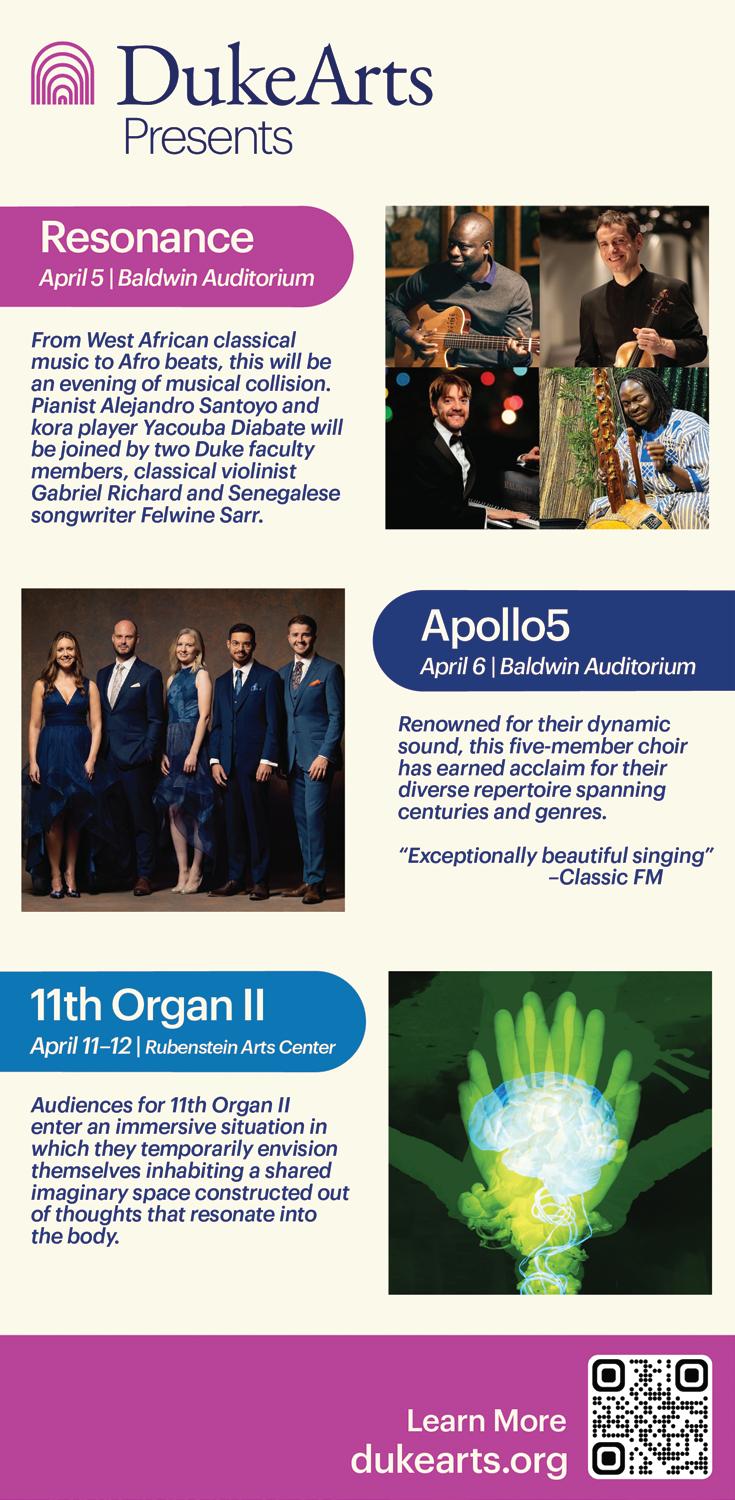
INDYweek.com April 3, 2024 3
C K
WANT TO SEE YOUR NAME IN BOLD? indyweek.com backtalk@indyweek.com @INDYWeekNC @indyweek
A L K
VOIC E S
My Noncommitment to Hypocrisy
Why I and others in the Triangle didn’t bend for Joe Biden on Super Tuesday
BY DESMERA GATEWOOD backtalk@indyweek.com
Ifear nothing but fear itself. And the fear of letting go of what we know in place of embracing what happens when we stand firm on principle will continue to be the barrier to progress.
There is no choosing a lesser of two evils, only the rejection of evil. You do not have to support one evil to avoid another. That is a false choice and a game of manipulation that kept slaves in the United States from fleeing the plantation for fear of a worse fate if they abandoned the oxymoronic “good slave master.” Fear of a worse fate keeps those with a compromised self-worth feeling beholden to an abusive relationship. Fear of a worse fate keeps people silent when they see abuse. Fear of a worse fate makes us comfortable with the colloquial devil we know.
But what happens when we turn our back on that familiar devil? What happens if we replace fear with hope and principle?
One of the most beautiful quotes that a friend who was a member of the Dream Defenders relayed to me was that it takes optimism to be a revolutionary—not cynicism. It requires envisioning a reality outside of what we’ve been given, a level of faith that the masses can do the right thing.
I have no crystal ball to tell you what will happen between now and November, but as of today, I have seen that President Joe Biden has funded the massacre of at least 40,000 people in Palestine, most of them children. More will die from malnutrition, and more from bombs. Even by Biden’s own admission, Israel must do more to “protect the lives of civilians.” Still, there’s a simple answer: Stop the
bombing. He hasn’t asked that of Israel. Biden is writing the checks for bombs continually and then lightly scolding Israel for doing the same thing over and over again.

What makes those children who suffer in Palestine any different from my own child? What more worst-case scenario is there than the loss of life? What if I lost my child? How would I stomach hearing someone say they support the person who paid for the bomb that blew off my child’s limbs because the other has a scarier agenda? I would resent them for believing they have no power to change the binary of a choice between Biden and Trump.
At times, I’ve thought of the image of Mamie Till sorrowing over the mutilation of her 14-year-old son, Emmett Till, and I wonder how many people deluded themselves into believing that that reality was the best version of life that existed.
I’m in great company with the 14 percent of Durham voters who cast Democratic ballots and voted “no preference” in this year’s primary. I’m in great company with the protesters who successfully agitated for a ceasefire vote at the Durham City Council.
The only way we can change anything is to start changing ourselves—our thinking, our actions, our principles. When we say “abandon Biden,” we name his candidacy specifically because there was a point where we were made to believe that Biden was decent for the world. Massacres later, we learned it wasn’t true. We don’t have to say we are abandoning Trump, because we were never there, and there is no connec-
tion to abandon.
But Biden is the placeholder for the word “fear.” We’re abandoning the fearful false choice that justifies support for a man who sends money to an operation to kill and remove a people. We’re at peace with the decision to detach from that wielder of pain, at peace with being principled and focusing our money, energy, and solidarity on those with a conscience and a plan to make this world better.
I am a person of faith. God has never indicated to me that turning my back on evil will create more evil. But God has shown me that if I want a world like Jesus desired, there’s no place for settling for any version of evil. There’s no place for fear, only love. It is out of my love for Mamie Till’s baby Emmett Till, and the Palestinian mother’s baby I don’t know, that I will not associate myself with anyone who is indifferent to another mother’s baby dying in the name of an alliance.
I am not naive. I, like many in this movement, in the Triangle and throughout the world, am very informed. We understand how this works.
To align with this movement isn’t to zero in on one issue. It’s an acknowledgement that our continued financial and military support for the massacre and removal of Palestinians is a connection, reflection, and intersection of every issue we as oppressed people see at home. Food insecurity of children domestically, starva-
tion of children abroad. The militarization of police domestically, the militarization of police abroad. The reproductive injustice at home, the sterilization of reproductive systems abroad. The immigrant crisis at home, the refugee crisis abroad. The low wages, student debt, lack of health care, underfunded school systems—the competition between funding the quality of life at home and pledging funding for military operations that destroy life abroad.
If it’s easier for critics to reduce our analyses and firm principle to “one-issue voting”—genocide being the issue at hand—I’m fine with that being where I draw the line.
In November, if you vote out of what you consider to be fear for what may happen in the future, that’s on you. If we abstain, based on the current situation and our principles, that’s on us. If Joe Biden loses because he ignored the cries for an end to human suffering, that’s on him.
Full stop. W
Special thank you to Dr. Burhan Ghanayem, Dr. Rania Masri, and Dr. Ajamu Amiri Dillahunt Jr. for their scholarship, local organizing, and activism for Palestine here in the Triangle.
Desmera Gatewood is a neurodivergent, Black, non-binary writer and organization development practitioner. They get joy from parenting, sudoku competitions, and group facilitation.
4 April 3, 2024 INDYweek.com
PHOTO ILLUSTRATION BY ANN SALMAN, PHOTO VIA UNSPLASH



INDYweek.com April 3, 2024 5 Get your culture x. Follow @INDYWeek on Twitter, Facebook, and Instagram for breaking news.
N E W S Chapel Hill
Back to the Drawing Board
Chapel Hill’s town council is trying to figure out what to do with the town’s many volunteer advisory groups.
BY CHASE PELLEGRINI DE PAUR chase@indyweek.com
At a September work session, Susan Brown, director of strategic communications for the Town of Chapel Hill, estimated that town staff spends $10,000 worth of time each month preparing materials for the town’s boards— even though it’s not clear what purpose many of the boards serve.
“I’m sorry,” town council member Paris Miller-Foushee interrupted. “Did you say $10,000?”
Now, Chapel Hill’s council members are deciding if the volunteer advisory bodies add value to the town’s government or if the boards and commissions are irredeemable, resource-sucking pits of obsolescence. While mostly everyone in the town government recognizes problems with the current structure, no one is quite sure how to fix them.
What is an advisory board?
Most municipalities have some form of citizen advisory boards.
In Chapel Hill, these roughly 20 advisory bodies are pitched as forums for citizens to participate in government voluntarily by giving feedback to the town on specific topics—from development design to stormwater management utility—without having to run for office. Anyone who lives in the town can apply to serve on a board, and council members vote to appoint the members.
Chapel Hill, like most small municipalities, uses a council-manager form of government. It operates a lot like a business—the council, elected by the people, is like a board of trustees, and the mayor is the chair. The council appoints a town manager, who serves as a nonpolitical CEO of the town. Because the manager
is responsible for hiring and firing town staff, the staff is relatively insulated from the politics of the town council. If shareholders—that is, voters—aren’t getting the return on investment that they want, they can vote out the council and mayor but cannot, say, directly fire the director of transit.
Part of the problem with boards and commissions is that they don’t clearly fit into that structure.
“I am, to this day, not totally clear what the delineation is between the Stormwater Management Utility Advisory Board and the stormwater staff,” said then-council member (and current mayor) Jess Anderson at a November meeting.
In certain situations, boards have helped fill gaps that the town staff apparatus needed more time to address.
Brown cited the Justice in Action Committee as an example. The committee was created in the early 2000s, originally to provide recommendations on renaming Martin Luther King Jr. Boulevard (then called Airport Road). After that, it shifted its focus to “the substantive issues of race, economics, social justice, and power.”
But a lot has changed in the town since then.
“We have a DEI office, we have a language justice plan, and numerous other large- and small-scale efforts around racial, economic, and social justice,” said Brown. “And in recent years, the committee has struggled with finding a clear charge and meaningful meeting content.”
So at the end of 2023, the council decided to dissolve that committee.
Some other committees may be getting the ax, too, although staff prefer to use the more diplomatic verb “sunset.”

Why are boards on the agenda now?
Last year, the council asked the staff to look at the effectiveness of the town’s boards. At several recent meetings, staff members have come back with a series of evaluations, noting that many boards lack a clear purpose or often don’t have the quorum necessary to make decisions. Brown and her team have provided recommendations, including delineating board missions, introducing training for members, and standardizing board sizes, schedules, and scope.
Brown used the Library Advisory Board, formerly known as the Library Board of Trustees, as an example of a successful change.
“Some members thought that it had a governance, fiduciary, or oversight role,” said Brown. “Others thought of it more as a volunteer nonprofit board that conceived of programs and services …. Because of these different understandings of roles and charges, there was a lot of frustration and confusion.”
Miller-Foushee pushed for a more aggressive reevaluation.
“I don’t want to be married to boards and
commissions for the sake of being married to boards and commissions,” she said.
The council members are familiar with the intricacies of boards because nearly all of them served on boards before they ran for council. In recent years, especially, candidates have pointed to that experience as an authentic demonstration of interest in town government.
Council member Camille Berry, who did not previously serve on a town board, questioned that experience as a credential.
“We have folks in the media … saying, ‘Here are your candidates, but have they served on an advisory board?’ I did not,” Berry said. “But I certainly serve this community.”
Who serves on boards?
To some council members, board membership is part of the problem. In Chapel Hill especially, many of the most politically involved folks are old, white homeowners.
It’s hard to imagine a lower-income fulltime worker choosing to attend a six p.m. board meeting, especially if they have kids
6 April 3, 2024 INDYweek.com
PHOTO ILLUSTRATION BY ANN SALMAN, PHOTOS VIA UNSPLASH AND PEXELS
at home. The town has made some real efforts—in 2018, the council approved funds for childcare and transportation assistance in an attempt to increase diversity. But there’s still a lot of work ahead.
“Our boards … don’t work for our diverse community. They’re not the right way to get community input,” said council member Karen Stegman at the November meeting. “We need to find another way to get that input and not pretend that’s what [boards are].”
The staff and council have also started looking at the application process.
“The current process is not intuitive or easy to use,” said Brown in March. “The current process carries a fairly high administrative burden for staff. And the current application and appointment processes were not designed to create a diverse field of candidates.”
How can the council and boards shift to a policy focus?
With the ongoing process of rewriting the town’s land use management ordinance, the council has been trying to reorient its focus to policy. Council members hope to bring that vision to any future iterations of boards as well.
“2024 has been the year of trying to figure out how do we get into that policy lane and really stay there? And how do we also fulfill our commitment to the community as sometimes a little bit of an oversight board?” said Mayor Anderson at the March meeting.
But that reorientation may take a lot of legwork. Former council member Tai Huynh, speaking in his last month on the board, was perhaps the most candid in his assessment.
“The outcome that I really wanted from [boards] was them gone,” said Huynh, citing his own experience on the Housing Advisory Board. “Even the deep-dive discussions that [the housing board] had I don’t think ever really made it to council. And at the end of the day, we didn’t really know what we were talking about.”
The conversation at the council table has been generally amiable—it’s not exactly a nuclear topic. But staff cannot make much change without the blessing of the nine council members, who all seem to have slightly different priorities.
“I’m trying to get y’all to tell us what you want so we can try and bring it back to you,” Brown said to the council in November.
In March, the council agreed to discuss the issue further at a later work session. W


INDYweek.com April 3, 2024 7
N E W S Durham Money Talks
Higher pay for city workers and an Office of Survivor Care top Durham residents’ wish lists at the city’s first budget hearing of the year.
BY JUSTIN LAIDLAW jlaidlaw@indyweek.com
More than 60 Durham residents from a variety of coalitions made their cases for how the city should allocate money in its 2024–25 fiscal year budget at a public hearing late last month.
City worker pay was a prominent issue going into the meeting. Last September, members of the solid waste department walked off the job for five days in protest of low wages. Their efforts were rewarded with onetime bonuses in October ranging from $500 to $5,000 for full-time and part-time employees, but the concerns over permanent wage increases still lingered. At the time, solid waste employee George Bacote told the INDY that he didn’t spend much time engaging with politics before September, but because the wage issue hit close to home, he said he’s “here for the long run.”
Bacote kept his word. At the March 18 council meeting, he walked to the podium as the first in-person speaker, still wearing his neon work vest.
“How can our job be so important but we get paid so little?” Bacote asked the city council.
Bacote says solid waste employees do their job in harsh conditions, in snow and extreme heat, but are not appropriately compensated for being “essential” workers. Other city workers, including Durham firefighters, and residents spoke to the rising costs of living in Durham and to the fact

that many city employees feel they can’t afford to live in the city in which they work and serve.
“Who are our neighbors?” asked Kevin Georgas, a pastor at Jubilee Baptist Church in Chapel Hill, in a question directed to the council. “You all have an opportunity tonight to give your own answer to that question through this budget. Do you think the people who pick up our trash, who clean our streets, who keep our city beautiful, are your neighbors, or do you think they are just human resources?”
Wages were just one of the motivating issues for residents on Monday. The first proposal to come before the council concerned funding a three-year pilot for an Office of Survivor Care, which would offer support to survivors of gun violence and their families using restorative justice methods such as facilitative listening circles and peer support groups. The new office would fall under the city’s Community Safety Department, according to the proposal.
Earlier this month, the city council voted 4–3 not to renew its contract with SoundThinking, the company behind ShotSpotter. Many opponents of the technology suggested the city find alternative methods for spending money budgeted for public safety. The cost to pilot the Office of Survivor Care in its first year is about $220,000, roughly the same amount as
the one-year pilot for ShotSpotter that the city council approved at the end of 2022. Funding for the second and third years for the Office of Survivor Care would cost $820,000, more than a third of which would be used to cover funeral and burial expenses for homicide victims’ families and would be reimbursed by North Carolina’s Crime Victims’ Compensation Fund.
Unlike Durham’s other publicly funded survivor support services, which the police department and the DA’s office provide, the Office of Survivor Care wouldn’t limit its services to survivors who are involved in ongoing trials or investigations.
“Survivor support cannot focus merely on the survivors of violence where an arrest was made and a criminal trial ensued,” the proposal for the pilot states. “For one thing, many harmed by violence never report the incident to crisis response or law enforcement. For another, only a fraction of the violent incidents reported to law enforcement result in arrest. Of those, only a fraction result in any criminal trial. Even those criminal trials provide little healing to violence survivors and their families.”
The pilot has already had its own pilot of sorts: from 2022 to 2023, the Community Safety Department collaborated with NC Central University, Duke University, and Restorative Justice Durham on a program called Prescriptions for Repair that encouraged survivors of gun violence
to share their stories during a series of listening sessions.
The first speaker at the meeting to champion the office was Frank Stasio, former host of WUNC’s The State of Things and a volunteer facilitator for Prescriptions for Repair, who used his years of experience on the radio to capture the audience with a compelling call for support.
“Hurt people hurt people. Healed people heal people,” said Stasio. “And without healing the trauma that is rampant in our community, it is unlikely that enforcement is enough to do the job to make the public safe.”
Other big-ticket items that residents recommended include stronger commitments to road safety for cyclists and pedestrians, remediation of the lead and other toxins in Durham parks, and a small area plan for residents to better manage growth in their neighborhoods.
On May 20, the city manager will present a budget proposal to the city council for consideration. Council members will have the opportunity to give feedback and make recommendations before residents weigh in a second time during a public hearing on June 3.
The city is legally obligated to vote on a final budget by June 30. W
INDY staff writer Lena Geller contributed reporting to this story.
8 April 3, 2024 INDYweek.com
ILLUSTRATION BY NICOLE PAJOR MOORE
N E W S Raleigh

Who Gets to Watch?
Raleigh cops told a judge that allowing the public to see footage of a botched raid would be “dangerous.”
BY CHARLOTTE KRAMON AND JEFFREY BILLMAN backtalk@indyweek.com
Last Tuesday, the Raleigh Police Department (RPD) asked a judge to block the release of body-camera footage from the botched raid of Amir and Mirian Ibrahim Abboud’s home in April 2021. On Thursday, the judge obliged.
According to court records, an RPD SWAT team, “suddenly and without warning, broke and busted open the Abbouds’ front door with a battering ram, pointing their long, AR-styled firearms at Mr. Abboud, Mrs. Abboud, and their 11-month-old son.” Though the search warrant was ultimately based on mistaken identity—State Bureau of Investigation (SBI) agents confused Abboud with a neighbor who is also of Arab descent—the police refused to pay for the damage, court records show.
In February 2023, the Abbouds filed a complaint against the SBI with the state’s industrial commission— which decides negligence claims against state agencies— alleging that the SBI errors caused the Abboud family “to experience severe emotional distress and trauma” and their infant son “severe trauma and developmental issues.”
In December 2023, along with The Assembly and the INDY, they also sued the city to force the release of
the SWAT team’s body-camera footage. According to the complaint, filed by the UNC School of Law’s Civil Legal Assistance Clinic, Raleigh police “wrongfully executed a ‘Quick Knock’ warrant”—meaning they kicked in the door before the Abbouds had a chance to open it—“terrorizing them and their child.” The complaint said the Abbouds hope releasing the footage will “provide the public with relevant information about the operation of a government-funded police force.”
Taxpayers have paid millions of dollars to equip police with body cameras, UNC law student Jack Salt told special superior court judge Matthew T. Houston during Tuesday’s hearing, which was held remotely. Withholding the footage “defeats the purpose,” he said.
Under state law, body-cam footage is not a public record. But judges can release footage if they deem it necessary to “advance a compelling public interest.”
While numerous media outlets—including The Assembly, the INDY, The News & Observer, WRAL, Rolling Stone, and Radley Balko’s The Watch—have reported on the RPD’s controversial use of “quick-knock” warrants, the RPD argued in court filings that the Abbouds’ request did not meet the “public interest” standard.
The RPD pointed out that an attorney for the Abbouds had released home security footage of the raid online, which the police said made releasing the body-camera footage redundant. At the same time, the RPD claimed that releasing the body-camera footage might expose confidential information about search warrant execution or damage officers’ reputations.
At Tuesday’s hearing, RPD attorney Sherita Walton told Houston—who was appointed by NC Senate leader Phil Berger last year—that the Abboud raid was “valid on its face” and insisted that none of the officers did anything wrong. Walton said releasing the footage would be “dangerous.” (The SBI also asked Judge Houston to withhold the footage.)
As precedent, Walton pointed to a 2022 case in which a Wake County judge refused to release footage of the botched RPD raid of Yolanda Irving’s home in 2020.
But in an email to Houston after the hearing, UNC Civil Legal Assistance Clinic director Elizabeth Simpson pointed out that the judge only denied the request “at this time” because the Irving family had yet to see the footage. In addition, Simpson said that multiple media outlets had not joined the Irving family in seeking the footage, as The Assembly and the INDY had done in this case.
Simpson also disputed the RPD’s claim that there was no misconduct: “The officers did engage in unlawful conduct by entering the home simultaneously with their announcement. North Carolina law requires ‘Knock and Announce’ for warrant execution.”
Simpson also implored Houston to reject the RPD’s suggestion that footage should be released only following incidents involving fatalities or serious injuries, citing a unanimous NC Supreme Court decision from December 2002: “History teaches us that opaque decision-making destroys trust; recent history involving police body cameras emphasizes this risk,” wrote Justice Robin Hudson, a Democrat who has since retired.
Houston responded that he would “be in touch in short order.” Two days later, the judge ruled there is “no compelling public interest” to release the body-cam footage. If the search warrant was faulty, Houston reasoned, the raid was “without inherently noteworthy or distinguishing circumstances or characteristics” and therefore not “of particular public interest.”
The UNC Civil Legal Assistance Clinic said in a press release that it was shocked at the judge’s decision.
“We believe this to be a blow to transparency and accountability to the public,” the release stated. W
Jeffrey Billman reports on politics and the law for The Assembly. He is the former editor-in-chief of INDY Week
Charlotte Kramon, a Duke University senior from Los Angeles, reports for The Assembly and Ninth Street Journal
INDYweek.com April 3, 2024 9
PHOTO ILLUSTRATION BY NICOLE PAJOR MOORE, PHOTOS VIA RALEIGH POLICE DEPARTMENT AND WIKIMEDIA COMMONS
Hill
The Future of Truth
As artificial intelligence upends the media landscape, professors at UNC, and journalists across the country, grapple with how to teach and apply it.
BY MIKE MACMILLAN backtalk@indyweek.com
UNC-Chapel Hill’s Carroll Hall sits just off the main quad and is home to the Hussman School of Journalism and Media. Twelve granite steps lead up to its shallow east-facing portico shaded by a pediment held aloft by six Ionic columns, a nod to the Greeks.
On this sunny spring day, the building’s would-be journalists are away, out for spring break. On one side of the lobby the words of the First Amendment are carved into the wall. On the other is the Hussman credo, which reads in part, “The pursuit of truth is a noble goal of journalism. But the truth is not always apparent or known immediately.”
You can say that again.
Given the advances in generative artifical intelligence (AI) and its rapid deployment across the media landscape, this doesn’t seem likely to change anytime soon. For those charged with teaching the craft of journalism, the question is how to help the next generation of reporters manage through this seismic shift in technology, consistent with their historical role of trying to give readers, listeners, and viewers the information they need to parse out the “truth.”
To understand how educators are tackling this challenge, the INDY spoke with several prominent journalists, including Hussman dean Raul Reis, about how AI is impacting the teaching and practice of the profession. The application of AI has broad implications, especially in this year’s presidential election, and going forward the role of reporters in supplying facts and sussing out misinformation and disinformation remains as crucial as ever.
Fastest-growing consumer application
Introduced by OpenAI in November 2022, the generative AI–driven chatbot ChatGPT quickly became the fastest-growing consumer application in history, according to the investment firm UBS. But what exactly is meant by generative AI?
Put that query to ChatGPT and here’s what you get: “Generative AI refers to a class of artificial intelligence techniques that are designed to generate new data or content that resembles and often expands upon the patterns and characteristics of existing data. These systems learn from a dataset and can create new instances of data that are similar to the examples they were trained on.”
Specialized processors, better algorithms, and access to massive data sets are among the developments that make all this possible. Its impact is being felt everywhere. To again cite the chatbot, “It [generative AI] has shown promising results in creating realistic images, generating human-like text, synthesizing music, and much more. However, it also raises ethical concerns, particularly regarding the potential for generating misleading or harmful content, as well as issues related to intellectual property and privacy.”
Hussman’s Reis was named dean in July 2022, four short months before ChatGPT burst on the scene. Prior to joining UNC, Reis spent six years as dean of the School of Communication at Emerson College in Boston and before that, as dean of the

School of Journalism and Mass Communication at Florida International in Miami. He has worked as a reporter for both U.S. and Brazilian news organizations.
“Since I became an academic it’s been a nonstop train of emerging technologies,” says Reis. He places AI in the continuum of other new technologies that have disrupted the profession over the years, different in scale, possibly, but not in type.
“I think we [Hussman] can take a leadership position in the way AI is adopted,” Reis says of the school’s role in helping manage this transition. “We want to be part of the process of determining what is the future of the industry and how the industry is disrupted.”
Reis points out that UNC’s journalism school has a long history of innovation in data-driven journalism, pioneered by the recently deceased Phil Meyer, who has been called the “father of computer-assisted reporting.” To that end, Reis anticipates working closely with other schools within UNC, including the data science and business schools.
In considering how AI might play out in the classroom, Reis offers nothing revolutionary but rather is inclined to emphasize the basics.
“We teach critical thinking,” he says. “Not only data gathering, but how do you process that data? How do you separate truth from hallucinations [i.e., incorrect predictions resulting from the use of incomplete or biased data]?”
The last major disrupter, the internet, laid waste to a broad swathe of the journalism profession, and newsrooms around the world continue to feel its impact. What was true in the pre-internet age is even more true in the time of AI as misinformation is spread across a growing range of news and social media platforms, burying facts under an avalanche of data-driven deepfakes, further undermining trust in an industry whose credibility is already at or near an all-time low, according to research from Gallup.
In this context, AI is seen simultaneously as both a powerful tool and an existential threat. That dichotomy was captured in a recent internal memo to employees from Mathias Döpfner, the CEO of the German publisher Axel Springer, which owns Politico among other outlets.
“Artificial intelligence,” Döpfner wrote, “has the potential to make independent journalism better than it ever was—or simply replace it.”
Shannon McGregor, an associate professor at Hussman and a principal investigator with the Center for Information, Technology, and Public Life, holds a less Manichean view.
“It’s another technology but because it’s so new we tend to get this great excitement and also this moral panic,” McGregor says. “This is a cycle we tend to get over and over again—it’s the great hope, but also it’s going to ruin everything. Like many other technologies, most of the time it’s going to be
10 April 3, 2024 INDYweek.com N E
S
W
Chapel
PHOTO ILLUSTRATION BY NICOLE PAJOR MOORE, PHOTOS VIA UNSPLASH
used in pretty benign ways, but there will always be the outlier cases that can have these huge impacts.”
Former Hussman professor Chris Roush, who recently stepped down from his role as dean of the School of Communications at Quinnipiac University to return to practicing journalism, says that in one sense, “everyone becomes an editor for AI” when it is used as a research tool.
This can be good or bad. On the bad side, reporters can become increasingly dependent on a less-than-transparent technology to source the facts of a story or, with generative AI, to create the story itself. But AI can also be useful, summarizing lengthy documents, analyzing historical data, and writing reports, for example.
“If AI can write basic stories, it frees journalists up for longer, more analytical pieces that are more important to society,” Roush says.
Transparency is clearly an important issue, as is disclosure. But transparency in the sense that a reader understands the process through which AI derives a result is not really possible in many instances. Disclosure, too, has its own set of challenges. McGregor questions how journalists can gauge the level of disclosure they should use when they’ve employed some type of AI.
“A lot of that is an open question,” she says. “On the one hand, you could say that disclosure in any use case makes sense. But I don’t disclose when I’ve used the grammar editor on [Microsoft] Word.”
Everyone is worried
This year’s focal point for those worried about disinformation and misinformation is likely to be the U.S. presidential election, but the issue is one of global concern. In a survey conducted at the World Economic Forum in Davos, Switzerland, in January, attendees agreed that “false or wrong information poses the biggest danger to the world in the next two years,” according to a story in Bloomberg. This beat out other perennial worries such as extreme weather and involuntary migration.
“At Bloomberg, AI is probably the most anticipated and discussed subject, and that’s not going to change,” says Matthew Winkler, who cofounded Bloomberg News in 1990 and now serves as editor in chief emeritus. UNC Hussman has partnered with Bloomberg since 2017 to give students from diverse backgrounds the opportunity to learn the fundamentals of journalism.
There’s general agreement that adhering to what has traditionally been considered best practices will go a long way toward
inoculating the industry against potential AI-driven mischief.
“If you obey best practices, you’re aware of how your reporting can go awry,” says Winkler. “Is it transparent? Do I trust this data? How do I know this is true?”
“Journalists have to pay attention to second sourcing and verification when there is the potential that things have been manipulated,” says McGregor, noting that this will be particularly important around breaking news, where there is intense time pressure and “supercharged” issues. As in other areas, AI can cut both ways, making it easier to fact-check in some instances, for example, while in others “it [AI] makes it harder to discover the provenance of things,” she says.
Born in Indiana
The ability to sort through massive amounts of data to identify patterns—and through these patterns some kind of useful knowledge—is the defining feature of basic AI. Generative AI takes this a step further, creating new content by learning from the
be taught in the world of AI.
“Journalism schools have a big role to play in teaching the people who are going to lead our profession that one thing has never gone out of style is the need to verify whatever you report before you share it,” he says. “If it’s unique, it can’t possibly be taken at face value until we know why it’s unique. When something is three or four standard deviations from normal and there hasn’t been some biblical event, it has to be treated with great care and suspicion.”
First, let’s fire all the reporters
In this world, the journalist remains an indispensable actor. But if reporters are more needed than ever, you wouldn’t know it from recent news coming out of the industry. January of this year saw massive layoffs, with more than 500 journalists losing their jobs, according to a report from Challenger, Gray & Christmas, an employment consulting firm. Some of this reflects the continued impact of the internet on business models, but the rapid adoption of AI across news-
“Artificial intelligence has the potential to make independent journalism better than it ever was—or simply replace it.”
data. Almost by definition, these tasks aren’t replicable by humans in any practical time frame; the data sets are too big.
There is an old saying in the technology industry that “software is its own proof.” In other words, if it works, it works. But no code or algorithm can fully anticipate every circumstance in which it might find itself. That lack of traceable attribution can be a problem, as anyone who has seen those videos of automated cars driving into a deadend street over and over again can attest.
“ChatGPT continues to insist that I was born in Indiana,” Winkler says of an exercise in which he asked the algorithm to perform what should have been a simple task: pulling up his bio. (He was born in New York City.)
“So if you’re a journalist and you think AI is going to do the work for you, forget about it,” he says. “AI cannot replace the journalist if we care about the things that matter.”
Presumably, ChatGPT will eventually discover where the Bloomberg News cofounder was born, but Winkler makes a larger point about how the profession needs to
content for readers.
“Generative AI can enhance our journalistic skills and values and empower us to produce more relevant and impactful stories in ways that we can’t even imagine,” said one survey respondent.
Of course one individual’s personalized content is another’s news silo, so there are potential downsides as well. Sixty percent of those surveyed expressed concern about the “ethical implications of AI integration for editorial quality and other aspects of journalism,” including “values like accuracy, fairness, and transparency.” Debiasing— which goes to the sourcing of data by AI as well as the algorithms that underlie the technology—was cited as a major worry.
There was also this: the concern that generative AI has made possible the “production and distribution of disinformation at a scale we haven’t seen before,” coupled with the inability to cross-check a wholly manufactured story.
“AI-generated content is trickier to debunk because there’s no reference material to cross-check it with,” said another survey respondent. “It’s completely a work of fiction as opposed to a photo that has been manipulated—with this kind of disinformation you at least have an original photo with which to compare the false version.”
Better, deeper fakes, in other words.
A critical role
rooms is almost certainly a factor as well. JournalismAI—a global initiative from the London School of Economics think tank Polis that’s supported by the Google News Initiative—recently surveyed more than 120 editors, journalists, technologists, and media makers from 105 large and small newsrooms around the world on their use of AI. In its report on the research, the organization describes the growth as “explosive.”
Eighty-five percent of the survey’s respondents indicated they have experimented with generative AI technologies to author content and better interact with audiences, among other applications. More than 80 percent expected the use of AI to expand over the near term. Current uses included news gathering (75 percent), news production (90 percent), and news distribution (80 percent).
As to generative AI, those polled cite potential uses that include exploring new angles and perspectives that had not been considered before, generating hypotheses and scenarios that had not been previously considered, and creating more personalized
Responsible, public-interest journalism plays a critical role in the health of society. If the JournalismAI survey is any indication, those in the industry believe it will continue to evolve and survive and that its uniquely human qualities will allow it to find a way to coexist with the increasingly humanlike intelligence of generative AI and whatever comes next.
“News organizations have shown remarkable resilience and innovation in sustaining and sometimes thriving despite the challenges they have faced,” the JournalismAI survey concludes. “It might even be that in a world where gen AI is such a power, for ill as well as good, public interest journalism will be more important than ever.”
Winkler, for one, maintains his faith in the role that journalists have to play.
“If you’re interested in the pursuit of the truth, AI is not going to get you there today, tomorrow, or anytime soon,” he says.
But of course, not everyone is interested in the pursuit of truth. W
Mike MacMillan is a freelance writer based in Chapel Hill. He writes regularly on financial issues at his Substack, “Ask Archer.”
INDYweek.com April 3, 2024 11




 BY GLENN MCDONALD arts@indyweek.com
BY GLENN MCDONALD arts@indyweek.com




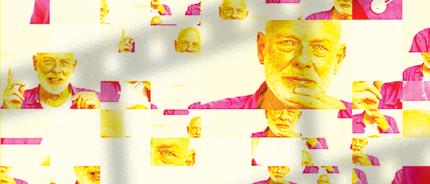










The 26th annual Full Frame Documentary Film Festival, unspooling April 4–7 in downtown Durham, will screen more than 50 films from 22 countries. Think of it as an abundance of great filmmaking, right in our yard. In anticipation of the annual event, we’ve got Q&A features on two documentaries we’re anticipating, Girls State and Family Tree, and a sampling of this year’s feature-length films, which give a sense of the festival’s ambitious depth and breadth. (There’s a whole other slate of short films on offer, too.) For information on times, dates, and tickets, visit the festival website.
Red Whiteville and Blue
Making its world premiere at Full Frame, director (and former INDY photographer) D. L. Anderson’s doc profiles a remarkable grassroots initiative with a local connection. North Carolina activist Erica Payne and her nonpartisan Great Economy Project join with working-class conservatives in Whiteville, NC, to fight for real and lasting change in living wage legislation. The group ultimately battles its way to the NC General Assembly on the power of an old political truism: meaningful change comes from the ground up.

Eno
In addition to pioneering entire vistas of ambient and electronic music, British musician Brian Eno has inspired generations of artists with his structural innovations to the creative process itself. (Google the phrase “Oblique Strategies” sometime.) This innovative profile from director Gary Hustwit, who is also curating this year’s thematic program alongside filmmaker Jessica Edwards, parallels Eno’s approach vector by using generative software to shuffle and randomize the film with each viewing: every individual screening is unique.

The Loving Story
Part of this year’s Tribute series honoring Full Frame founder Nancy Buirski, this acclaimed documentary chronicles the intriguing love story of Richard and Mildred Loving. In 1967, with the help of the ACLU, the Lovings took their case to the Supreme Court and overturned all remaining anti-miscegenation laws in the United States. Featuring some astonishing archival footage, Buirski’s film was shortlisted for an Oscar in 2012.

Agent of Happiness
Maybe this year’s most flat-out fascinating film, Agent of Happiness follows the adventures of Amber Kumar Gurung, whose job is to improve the happiness quotient in his native country of Bhutan. A predominantly Buddhist nation in the Himalayas, Bhutan is constitutionally mandated to assess and promote joy through its Ministry of Gross National Happiness. Amber is one of many happiness agents sent out with a mission—and a 148-question survey. The film earned ecstatic reviews, fittingly, at its Sundance premiere earlier this year.

12 April 3, 2024 INDYweek.com
PHOTOS COURTESY OF FULL FRAME DOCUMENTARY FILM FESTIVAL
All We Carry
One of several films this year to dig beneath the grim daily news headlines, All We Carry follows a Honduran immigrant family—mom, dad, and child—and their experience seeking asylum in the United States. Director Cady Voge takes a close-up vérité approach to the story, illuminating the immigrant experience at ground level over a threeyear period—following the family from cargo trains in Mexico and separation at the border to a caring synagogue community in Seattle.

A Stranger Quest
This unique film from Italy tells the delightfully odd story of map collector David Rumsey and his quest to create a kind of 21st-century spatial poem in the virtual realm of Second Life. Director Andrea Gatopoulos explores the essential mystery of maps, which exist in the notional space between the actual and the conceptual—in the nooks and crannies of art, technology, imagination, and history.

Union
Another deep dive beneath the headlines, Union details the three-year odyssey of Amazon warehouse employee Chris Smalls and his quest to unionize his fellow workers. Billed as the ultimate David-versus-Goliath story, the film reveals the enormous amount of effort required to fight back against Amazon’s relentless anti-union strategies. Union also slots into a proud tradition of films that document the enduring power of collective action.

Story & Pictures By
Filmmaker Joanna Rudnick tracks the history of children’s picture books by way of archival interviews with beloved authors (Maurice Sendak!) and, naturally, playful animated sequences. The film also tracks issues of diversity and representation by profiling three current authors who are expanding the form in terms of race, class, gender, and identity. A good documentary film can make you intensely curious about things you never stopped to think about before—like how picture books are most kids’ very first experience with storytelling.
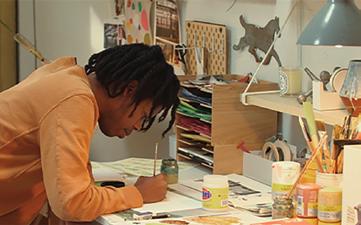
Luther: Never Too Much
Luther is the first full-length documentary to chronicle the life and art of R&B godfather Luther Vandross, generally acknowledged as one of the greatest vocalists of all time. Distilled from archival footage and more than 80 hours of performance clips, the film weaves in appearances from friends, family, and collaborators including Mariah Carey and Roberta Flack. Luther is slated as the closing-night film, which is usually pleasantly rowdy. Festival officials are forthright: bring your dancing shoes. W

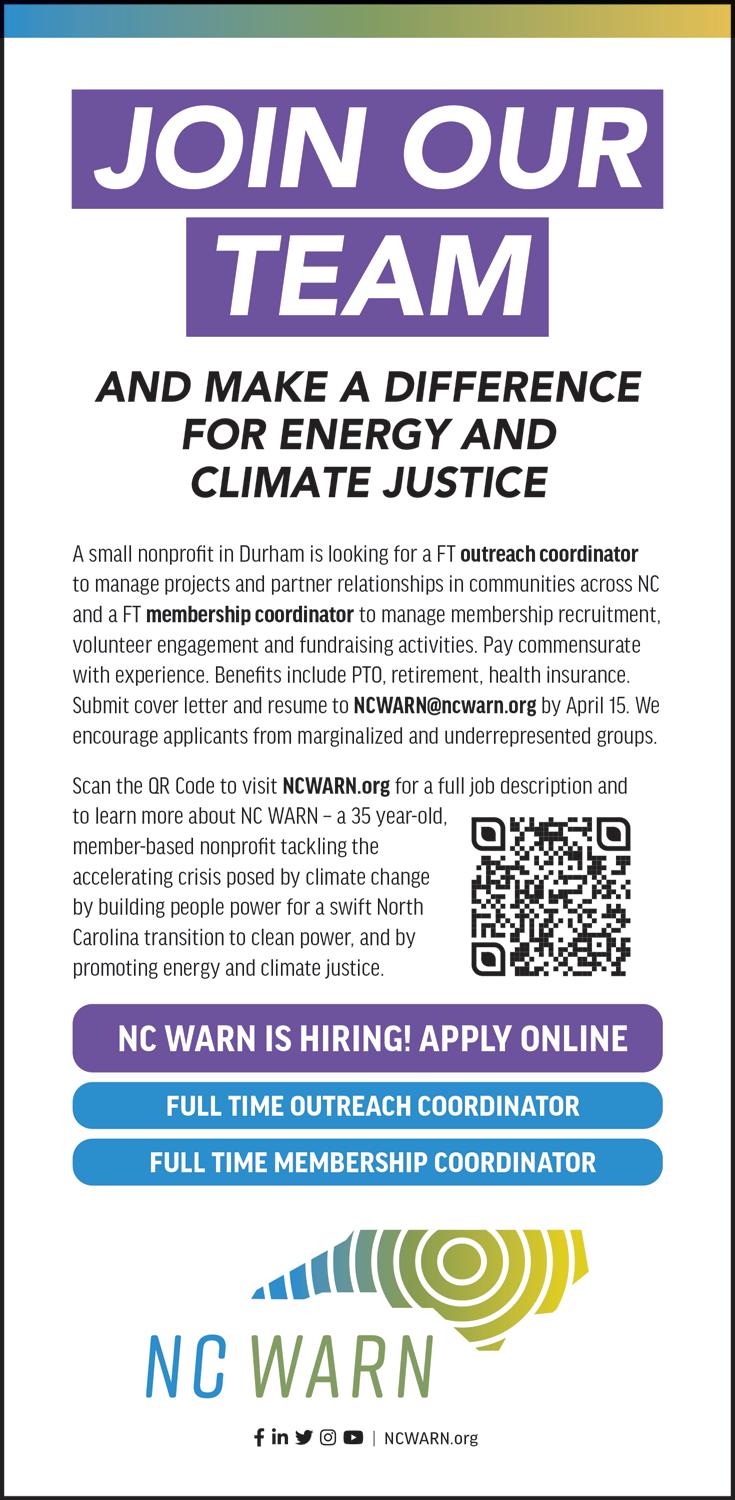
INDYweek.com April 3, 2024 13
Teenage Dreams
Speaking with Girl State directors Jesse Moss and Amanda McBaine about the documentary and mock government camp behind it.
BY LENA GELLER arts@indyweek.com
Ten minutes into Girls State, a documentary about what it would look like if teen girls from Missouri ran things for a week, a 17-year-old named Maddie starts to question the mock government camp’s star-spangled feminism.
“Something about this feels sexist,” she says during a song-and-dance exercise, dropping her arms. “If the boys don’t have to do this, I’m gonna be so pissed,” the camper beside her agrees.
Girls State, a program sponsored by the American Legion, is held annually in every state alongside a companion program, Boys State. Curiosity about the siloed boys’ program, just across campus, runs high with these girls.
It’s easy to go into Girls State with qualms that the film will lean on tired girlboss tropes or revel in portraying a feminist utopia while neglecting intersectionality. But directors Jesse Moss and Amanda McBaine are smart and self-aware in chronicling the summer program for high school juniors, striking a tone somewhere between a riveting election night broadcast and Bo Burnham’s comingof-age tearjerker Eighth Grade. Girls State is a follow-up to the 2020 documentary Boys State, also directed by Moss and McBaine, which centered on the Boys State program in Texas. Ahead of Girls State’s premiere at Full Frame and on Apple TV+ on April 5, the INDY spoke with Moss and McBaine about how the documentary came to be.
INDY: What about the Girls State and Boys State programs spoke to you, as documentary filmmakers?
JESSE MOSS: In 2017, the country was being torn apart. Trump was president. Our divisions were, and still are, so pronounced. We were looking to make sense of our country and future and democracy. We’d read about the Texas [Boys State] program and we liked the idea that these programs could be a window into young people coming of age in this moment. This idea of civil discourse: Have we lost it, or can we still talk to each other despite our political differences? Here was a laboratory to explore that question with 17-year-olds. We thought this could be a total bomb. But we went to Texas, and it was extraordinary. We knew

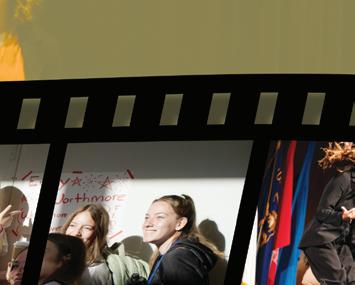





even before we filmed [Boys State] that Girls State needed to be part of this conversation. We weren’t sure where we would make it, but we knew why.
What does Girls State reflect about the state of political polarization in the United States? What perceptions does it uphold, and what does it debunk?
AMANDA MCBAINE: When we were casting the people we were going to follow through the week, we ended up talking to hundreds of kids, and in talking to them about their politics, it was really interesting—this is true in Boys State, too—how few of them identified as one party or the other. They hadn’t yet had to vote—to be forced to actually check a box—so their politics seemed to be more à la carte. They seemed to identify more as independents. And they were open to listening to one another in a way that I knew that they were just more excited to have those conversations than I feel like I hear of my contemporaries. So I think that gave me a feeling of hope that we can hearken back to that space of not being put into two tribes and remember the humanity of it all.
MOSS: It was a question for us, too: Do girls do things differently? We watched how the boys behaved in Boys State, and I won’t spoil the film for you, but I’ll say this, it’s pretty tribal. There’s a lot of chest-thumping and push-ups. You see dirty tricks. We had people say to us, “Oh, with girls, it’s
going to be Mean Girls, or it’s going to be a catfight,” but that’s not at all what we saw. We saw girls who wanted to engage in healthy civil discourse. Who are incredibly ambitious and fortified in their own political positions but also are not kind of rigid in the ways that adults are, or tribal in the ways they imagined forming connections with each other. We saw friendships form across divisions that were really kind of surprising. We didn’t see that in Boys State.
Talk to me about Emily Worthmore. How did you land on her as a protagonist?
MCBAINE: Jesse likes to say that a lot of these kids chose themselves, and I think it’s true.
Emily, from the minute she started talking—she opened with “I want to run for president,” and she said it in a way that was just startling. She meant it. She has a website with a ticker of how many days before she turns the age when she can start campaigning. I just loved the confidence and joy; that she was leaping into this. Also, she’s a conservative kid, and that’s different from my politics. So already, the civil discourse project was happening in us having a dialogue. I really love this kid. She’s extraordinary. But her politics are not mine. And that’s an interesting thing, to root for a person when that’s the dynamic that we have.
MOSS: Not even to root for them, but to not cut them off. To say, “OK, I’m gonna give myself permission to listen to you and to go on a journey with you.”
14 April 3, 2024 INDYweek.com SCREEN
PHOTO ILLUSTRATION BY ANN SALMAN, PHOTOS COURTESY OF APPLE TV+
Frame Documentary Festival | Thursday, April 4,
|
GIRLS STATE Full
at 8 p.m.
The
Carolina Theatre, Durham
The Supreme Court’s Dobbs opinion was leaked soon before the events of Girls State took place. Did that change how you shaped the film? Did abortion end up being a bigger focus because of it?
MCBAINE: Abortion has been a conversation at Girls State sessions for many years. It’s one of those political debates that’s going to come up. One of the reasons we were interested in going to a Girls State program was because they build the third branch of government, the Supreme Court. Boys State in Texas doesn’t have that. We couldn’t have known that this leaked opinion was going to be released right before the girls convened in Missouri, where there was a trigger law. We couldn’t have known the stakes were going to be that high or that it was going to feel that emotional and electric. But you sure hope, as a documentarian, that you land in those moments in time when things are kind of in a pressure cooker.
How did you go about bringing intersectionality into Girls State?
MOSS: I’ll say a couple of things. The permission we gave ourselves with this film versus Boys State was to have more voices and to not limit the number of protagonists. Boys State has four subjects; this film has seven. We felt that there were more perspectives that needed to be present and that it was OK if the story got a little bit messy. Following the races for governor and Supreme Court meant that we could watch the women in this film, particularly the women of color, navigate the space in their own distinct ways. It was important for us to spend as much time as we did casting the film to represent the diversity of perspectives of Missouri girlhood.
I think, in particular, to see Maddie, who identifies as gay and who’s very left-wing, forge a very strong, supportive friendship with Emily, who is Christian and conservative and has very different politics from
“We saw girls who wanted to engage in healthy civil discourse. Who are incredibly ambitious and fortified in their own political positions but also are not kind of rigid in the ways that adults are.”
MOSS: I think what’s fascinating about these programs, because they’re so big and so diverse, is that they’re very sensitive instruments to the changing weather of our political system. We had heard the boys talking about abortion, but they were sort of scared because they knew without women there to be part of the conversation it really wasn’t right. So I think in some ways, the timing [of Girls State] was sort of accidentally charged. We are interested in filming these programs because they are forums for conversation about issues that divide us as a country.
I listened to the Supreme Court argument this morning on abortion. Where are we headed? For us as filmmakers, it’s about finding a way to have a conversation that brings people to the table, particularly young people. Teenagers watched Boys State. It’s kind of amazing, our own kids, our teenage daughters, watched it.
MCBAINE: They gave it a thumbs-up. That’s never happened in the history of parenting.

her—I think that is one definition of intersectionality that’s important to see.
For young people, perhaps it represents their everyday lives. But for an older generation that has more conservative assumptions about how young people engage in politics and form friendships and how they present their identities, I think it’s really inspiring.
MCBAINE: This is a bigger conversation, but the program itself is quite old-fashioned. It’s been around for a long time. It’s gender segregated. This Missouri session was as close as they’d come to [changing that], in a parallel play and sharing some of their resources, and I think that’s the trajectory of where things are going. I don’t know because I don’t run these programs, but [I could imagine] a kind of People’s State emerging. And then there’ll be all kinds of interesting conversations about who can win in that space. I can only feel optimistic about all of it, because that’s my nature. But we’ll see. W
INDYweek.com April 3, 2024 15 Call 844-515-0862 to schedule your free quote!
C R E E N
Deep Roots
Speaking with director Jennifer MacArthur about Family Tree, a documentary following two Black families in North Carolina fighting to protect their land.
BY JUSTIN LAIDLAW arts@indyweek.com
New documentary Family Tree takes us into the world of sustainable forestry through the lens of two Black families in rural North Carolina during pivotal moments in their business and family history. Black land ownership has dwindled since the beginning of the 20th century, and Family Tree examines the ways that creating multi-generational economic and ecological sustainability for families requires deepening familial ties and creating a strong foundation of trust.
Jennifer MacArthur, the film’s director, brings audiences inside intimate moments between the two Black families— the Jefferies and Williams—while detailing the burden that land theft has on Black families and the planet. In doing so, Family Tree strikes a compelling balance between a call to action to protect our climate future, and a reflection on the importance of human connection, two things that are also deeply personal to MacArthur. Ahead of the film’s debut at Full Frame on Friday, April 5, we spent time talking with the director.
INDY: What motivated you to make Family Tree?
MACARTHUR: I was going through my own reconnection with nature. I grew up in the country outside of New York City, but when I was a teenager we moved to Alaska. This was in the ’90s. There weren’t things like satellite television. It was very remote and rural, even in Anchorage. When I left Alaska, I moved to New York where I lived for 20 years, but I’m still a bumpkin.
I feel like there’s such an association with the Black experience in America and cities and urban environments. The reality is that we’re all country people. Most of us live in the South and a lot of us are living in exurbs or in rural places. So the film is an opportunity for me to explore that lifestyle and that way of being, and show a different side to the Black experience and our identity, one that I think is central to our experience as Americans.
Tyrone and Nikki are compelling narrators for the story. Why did you choose their stories to anchor this documentary?



There’s a way that you can approach storytelling when you are connected to land and to a place, you know, place-based storytelling, and I feel like that really comes through in the film. North Carolina is very much a character in the film. Our brilliant researcher, Nadine Natour, worked on the film RBG and a few other projects. She did the initial research and connected with SFLR, Sustainable Forestry and African American Land Retention. She kind of found the families initially and began to make the connections and sort of build that trust that it takes to really get people to want to participate in a film like this. And then, I can’t remember exactly how we came across Tyrone [Williams] and Fourtee Acres—but they’re kind of rock stars in the Black landowner community.
Why did you choose to show those intimate moments between families in a documentary about sustainable forestry?
We set out to make a film about sustainable forestry, but it’s just not going to connect with audiences in a way I think will hold their attention for 90 minutes. Maybe a two-minute film, or a five-minute film, that tells you the basics about what it is and how it works—sure. But if you want me to make a feature, it has to be something that can really hold people’s attention and that people will care about.
So we asked, “What are the barriers to people being able to hold on to their land and how does sustainable forestry help?” One of them was succession planning and passing down to the next generation—that’s Tyrone’s family, that’s what they represent. And then another one was getting access to resources and barriers to financing. That was the Jefferies family. So we dug into those two issues.
I just didn’t want to tell a story that was about something that was being done to Black people. I wanted to tell a story about our agency and what we do. And SFLR was clear that at the heart of all these challenges are the family relationships. A developer can’t come in and pick [the land] off if the family is communicating and they agree that this is what they want to do, right? So for me, the story was always about family dynamics and the personal and interpersonal relationships. That is where the juice lies.
What are lessons that you hope viewers take from the film?
I want to make sustainability something that’s real and something that’s accessible, not this buzzword that exists in climate spaces and environmental spaces and universities—places where people don’t feel comfortable.
What I’m trying to do is plant the seeds for the next world. I don’t want to focus on the dysfunction and the doom and gloom of the thing that is falling apart because it has to fall apart for us to get to the new thing. And it’s not going to feel good. It’s going to be challenging. Change is always hard and some people are going to suffer and it’s going to be painful. But we have to know that there’s something on the other side that’s worth living for. We have to plant those seeds. That’s what I’m trying to do with this film to help people understand that we as individuals, just with our family alone and our little sphere of influence, can decide that we’re going to plant the seeds for a future that is meaningful and that you can pass down to your children and the community around you and their children. That’s hopefully the takeaway: that people will feel empowered and some sense of hope. W
16 April 3, 2024 INDYweek.com S
FAMILY TREE Full Frame Documentary Festival | Friday, April 5, 5 p.m. | The
Carolina Theatre,
Durham
PHOTO ILLUSTRATION BY ANN SALMAN, PHOTO COURTESY OF FULL FRAME DOCUMENTARY FILM FESTIVAL
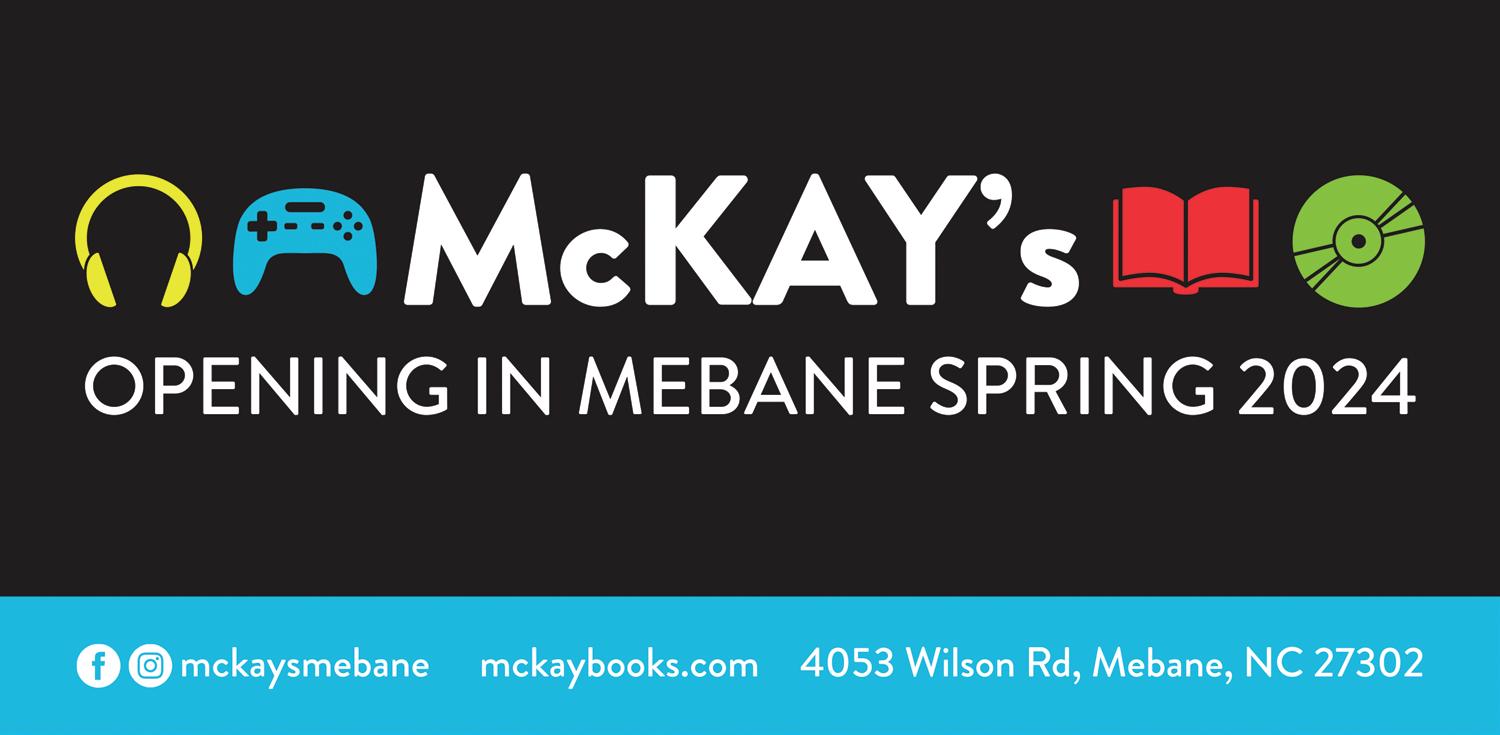


INDYweek.com April 3, 2024 17
M U S IC Spring Album Reviews
Cold Cream: Cold Cream II
HHHH
Self-released | Feb. 2
From the Dead Kennedys’ “Nazi Punks Fuck Off” to Minor Threat’s “Straight Edge,” there is something expressly punk about the form of the very short song— its polemical efficiency, its complete disregard for radio and commerce, its restive energy to get on to the next thing. Few have taken the idea further than the Brakes, a UK band whose 2005 album Give Blood featured 16 songs in less than 30 minutes, the shortest clocking in at seven seconds. (Its lyrics entirely: “Cheney, Cheney, Cheney, Cheney, Cheney, Cheney, Cheney, stop being such a dick!”)
But the Triangle’s Cold Cream gives the Brakes a close run on their second album, a barrel of laughs bursting into flames for no reason as it rolls toward a ravine.
The band is full of familiar faces in slightly mixed-up places: It includes Ron Liberti, the singer of the long-running indie band Pipe, though in this band configuration, malleable belter Mara Thomas is the singer, and Liberti plays the growling garage-punk guitar.
It also includes Laura King, a seasoned drummer who is now in Superchunk, but local-music omnipresence Clark Blomquist plays the drums (and synths), while King plays bass instead.
Together, the group takes evident inspiration from bands like the Ramones, The Clash, and X and hot-rods it down to the chassis, pinstriping the frames with funny,

seriously nonsensical lyrics and polishing them with potent melodic hooks.
There are shout-along theme songs with one-note guitar solos (“Cactus Wife”), minor-key sidewinders in the paranoid post-punk vein (“FastFashTreasureIsland”), and scissor-kicking moshers (“SeeSaw”). Especially striking is “Penelope,” where a ropy bass line and ocean waves of feedback conjure shades of the experimental side of Jawbreaker.
Cold Cream II is even more concise than the first number in their self-deprecatingly grandiose titling scheme, winking at Led Zeppelin. The average song length of 80 or 90 seconds has a strange time-lensing effect by which “Fixedair,” at almost three and a half minutes, becomes an epic odyssey to the bends of time and space, especially with the powerful arcs that Thomas’s vocal cuts through vibrating sludgerock mix.
This is a fun and furious record, like a supercut of the explosions from a movie about a band playing for its life in a world where “all killer, no filler” has been imposed as martial law. —Brian Howe
Magic Tuber Stringband: Needlefall HHHH
Thrill Jockey | March 22

“Back to the future” makes most people think of Michael J. Fox’s gum-smacking sass and Christopher Lloyd’s mad-scientist hair. But as a conceptual framework, the phrase is loaded with deeper meaning: a reverence for the past tempered with an embrace of innovation, perhaps.
Or, in the case of Durham-based duo Magic Tuber Stringband, it can indicate a heady blend of old-time jams and droning mysticism—communal joy juxtaposed with minimalist abstraction as Appalachian tradition toes an avant-garde line.
After just a half decade together, this singular blend seems like second nature for fiddler Courtney Werner and guitarist Evan Morgan. On the band’s fourth full-length, Needlefall, they effortlessly inhabit both ends of their sonic spectrum. Album opener “A Dance on a Sunday Night” rolls and tumbles like a winding mountain path before the driving rhythm of “Days of Longing” devolves into a dissonant dirge.
Field recordings inspired by Werner’s ecological work tie together mid-album improvisations “The Hermit’s Passage,” “Water Dripped Upwards,” and “The Long-Suffering,” the latter of which features squalls of saxophone from local legend Crowmeat Bob along with other polyphonic supplements from Andy McLeod and Dan Partridge.
On Needlefall’s closing trio of songs, Magic Tuber Stringband’s nuanced capabilities build to a powerful climax. The title track mirrors the changing of North Carolina’s seasons by constructing layers of cinematic rhythm a la improv icons Pauline Oliveros and Terry Riley.
“Twelfth House” highlights the elegant lockstep between Morgan’s 12-string guitar and Werner’s fluid fiddle arrangements. “Piney Woods Burn,” finally, puts an experimental bow on the entire affair, mournful strains of singing saw evoking the natural world that inspires this transcendent duo and informs their strongest work yet.
The fact that esteemed indie label Thrill Jockey Records signed Magic Tuber Stringband in 2023 and released Needlefall on March 22 might lead off any other review.
But since Werner and Morgan are redefining how traditional music can push the cutting-edge envelope, it’s a major career move that makes perfect sense. How high will these Triangle innovators fly? Follow the path blazed by Needlefall to find out.
—Nick McGregor
18 April 3, 2024 INDYweek.com
Rosali: Bite Down
HHHH
Merge Records | March 22
Album covers don’t often merit discussion in music reviews, but Bite Down, the Merge Records debut from Rosali Middleman, who performs as Rosali, has a particularly strange one. It’s a color photograph, no text: Rosali stares with wild eyes and bared teeth through the branches of a curly willow, like some joyful predator preparing to leap from the foliage.
At first, the unsettling image seems incompatible with the music that follows, which is a pleasantly warm mix of rock subgenres—folk, psych, blues—guided by Rosali’s golden voice. But Bite Down quickly reveals deeper ambivalences and the album cover comes into clearer focus: “Yeah you freak me out / And that’s what I came for,” Rosali sings on the beautiful but slightly sinister opener, “On Tonight.”
In 2021, Rosali relocated from Philadelphia to the Durham area, transplanting from one fertile music scene to another. (The endearingly low-budget music video for “Rewind,” one of the singles on Bite Down, was filmed in Carrboro’s All Day Records.) It was in Philadelphia that Rosali first connected with Omaha rocker David Nance and his band Mowed Sound, which played on her 2021 release, No Medium, and which appears again on Bite Down It would be a disservice to call Mowed Sound a backing band: They are the Crazy Horse to Rosali’s Neil Young, and match the charisma of their leading vocalist with

a convincing, occasionally unruly force. Near the end of “Hopeless,” a plaintive but resolute track about a departed lover, the crunchy guitars come barreling out of nowhere like a bull from a rodeo chute.
On “My Kind,” the members of Mowed Sound bang out a floor-shaking rhythm while Rosali growls, “How am I gonna live without you?”
Bite Down finds Middleman embodying that joyful predator from the album cover, trying to seize life in her jaws and give it a loving shake. “Help me darlin’,” she sings on the title track, “I can’t seem to / Bite down on it / I can’t seem to feel what’s real anymore.”
The warm, clean tone of the record belies its emotional murkiness. For all its radiance and emotional heft, Rosali’s voice does not divulge all its secrets. “Have you seen my grief?” she asks on the spiky “Slow Pain.” “Hold it so I don’t spill out / Keep quiet and wait it out.”
Bite Down closes with “May It Be on Offer,” a simmering prayer of a song whose plodding tambourine evokes The Velvet Underground’s “Venus in Furs.” All the guitars go silent and Rosali’s unshowy lyrics manage to find some clarity in the noise. “And I’ll sit for hours,” she sings, “Gazing at the light / And there I do wonder / And waste my life.” She corrects herself: “No, I don’t wonder / If I waste my life.”
—Tasso Hartzog
M U S IC Spring Album Reviews
land is: Free Radio Werewolf
HHH1/2
Self-released | March 1

Irrepressible Triangle musician and writer Corbie Hill’s work with electronic music stretches too far back to call new release Free Radio Werewolf a foray. His methods for pushing through 2020 included pulling together a previous full-length collection of spirited experiments.
This latest album fully merges his personality with electronica. It never feels amateurish, but it does seem to revel in the joy of honing new skills. The album, an electronic travelogue of a family trip out to rural Texas and New Mexico in the winter of 2022, collides moods that are alternately pensive and ecstatic. Skittering beats and eager melodies jut into laconic drones, like parents shaking kids awake, or kids yelling to get their parents’ attention when they see something along the road.
It’s the personal feel that’s most impressive. Indeed, while Hill listed off appropriate comparisons when he sent me the album—Boards of Canada, SUSS, Cowboy Sadness, Autechre, Tycho—I was left thinking more about the musician’s well-documented love for Star Trek
There’s a giddy irreverence that calls to mind The Next Generation’s Ten Forward lounge acts in the way these compositions throw simple, familiar sounds and melodic structures into patterns and filters that are slightly askew. And there’s a unifying sense, in the alternating loneliness and camaraderie expressed by the album’s
contrasting quietudes and cavalcades, that these sounds capture scenes experienced by a tight-knit crew on a long voyage.
Album opener “To Memphis” starts the journey with excitement, prancing and percolating like a Postal Service backing track, lo-fi electronics colliding with live drums and what sounds like a clarinet.
The vibe gets darker along the way. “Sideways Snow” plays like a deconstructed rap beat, with gun-click-esque sounds hyperventilating and giving way to arrhythmic bass hits and industrial scrapes and whirs. It sounds utterly exasperated with modern times. “Time Is Just Local Physics” finds a determined but low-key beat plowing forward below synthesizers that echo out dejection and resignation, like The National expressing their emotions entirely through music.
Connecting these extremes are songs that look out thoughtfully at the changing horizon. On “Red River Theme,” hand piano clicks through heavy reverb, with snippets of electronic melody, alternately concussive and sheeny, charting nebular clouds in the distance.
As with any long car trip, there are some off moments, contemplative tracks that are tedious, and moments when the energetic contrasts grate rather than excite. But more often than not, this intimate collection makes one glad to have taken the ride. —Jordan Lawrence W
INDYweek.com April 3, 2024 19
M U S IC
Garden Songs
With a summer partnership with Country Soul Songbook, Duke’s Music In the Garden concert series is going country.
BY SARAH EDWARDS music@indyweek.com
Back in March 2020, Country Soul Songbook, the media and production company from Durham’s Kamara Thomas and Kym Register, was just getting its bearings.
Thomas and Register, both musicians, had a vision of amplifying the voices of historically marginalized artists and expanding the conversation around Americana music—a mission with a sturdy foundation, given the Triangle’s reputation as a creative hotbed for roots music.
But the Songbook’s second-ever performance was ill-fated, Thomas tells the INDY, with a NorthStar Church of the Arts concert scheduled “on the eve of the pandemic.” The organization pivoted from stages to streaming, with a successful sequence of virtual summits and online archival work, though the two founders missed the in-person component of curating live music.
This summer, the Songbook returns to the stage. Thomas and Register are partnering with Duke Arts to curate the organization’s annual five-concert showcase, bringing in a mix of national and local musicians for tribute performances to underrecognized artists. A collaboration between the Music in the Gardens concert series—a local summer-evening staple, with its picnicking sprawl of friends, families, and first dates—and the Songbook feels like a match made in heaven.
“We started with a basic mission to integrate and intersectionalize country and Americana music stages. It’s been a great ride and a great expansion into understanding, like, ‘Oh, there’s lots of ways that we can do this mission,’” Thomas says of the organization’s online work over the past
few years. “But it’s really nice to just come back to the home base of our mission, literally and figuratively.”

In addition to the Wednesday evening performances, Thomas says, touring and local artists will rehearse the week ahead of the event, with collaborations going toward a compilation album. The series runs May 29-June 26 and the full lineup announcement will be announced in May.
“These are precisely the voices and music that Duke Arts seeks to amplify through our presenting series, and Country Soul Songbook has been an ideal partner for this work,” Aaron Shackelford, Duke Arts director of programming, shared in Duke Arts’ announcement of the collaboration. “Our vision is to invite more of the community not just to sit on the grass with us but to have greater participation on stage and, perhaps more importantly, have a voice in who gets invited to that stage and why.”
In recent years, there has been an overdue surge of momentum to diversify—and recognize the whitewashed roots of—country music. Nashville may serve up plenty of sweet tea, but its reputation with anyone who doesn’t fit the genre mold (dominantly white, male, and heterosexual) is far from hospitable.
In 2019, when Lil Nas X released the impossibly catchy “Old Town Road,” Billboard removed it from the country charts, prompting controversy. A 2022 report by the Black Music Coalition found that, over 19 years and 11,484 songs played by country stations, only 13 Black artists saw air-
time (and only three of those 13 artists were Black women).
“The long-standing industry lines that there isn’t enough Black talent, that there isn’t a Black country audience, and that the existing country core won’t embrace Black acts, endured so long because Music Row and the Country Music Association specifically, repeatedly ignored or suppressed indicators to the contrary,” the report read.
Despite little help from the industry, successful country artists like Mickey Guyton and Darius Rucker have made cultural inroads in recent years; Beyoncé’s new country album, Cowboy Carter, has also renewed talks of change.
All along, local artists have been instrumental in challenging conventions and shifting the conversation. Rissi Palmer, the artist behind 2007’s chart-making single “Country Girl,” lives in Durham and is the host of Apple Music radio show Color Me Country, which explores country music’s Black, Indigenous, and Latinx roots. Local duo Larry Bellorín and Joe Troop have trailblazed with a singular, cerebral blend of bluegrass and Venezuelan folk music. Greensboro’s Rhiannon Giddens, who has no shortage of accolades (in addition to her Grammys with the Carolina Chocolate Drops, Omar, the opera that Giddens cowrote with Michael Abels, won a Pulitzer Prize for Music in 2023) plays banjo on Beyoncé’s “Texas Hold ’Em.”
And then, of course, there’s Thomas and Register, who both write and perform music: Thomas is a solo singer-songwriter of “cosmic country soul,” while Register has performed as Loamlands the past few years, recently reworking the band as Meltdown Rodeo. (Register also owns the Pinhook, the queer, dusky downtown dive where you step off Main Street, pop open a Miller Lite can, and watch a drag show.) Both are excited about an opportunity to share the work of Country Soul Songbook on stage.
“I’ve always seen Music in the Gardens as an anchor of Durham’s cultural scene,” Thomas said in the Duke Arts announcement. “We are excited to bring our intersectional community of local and visiting artists to kick off the local summer concert season. There is a limitless pool of artists that we want to continue spotlighting.”
Admission to the annual series is free, though due to limited capacity, Duke Arts requires a digital reservation ahead of performances (registration opens Tuesdays at 11 a.m. one week before each event). For those unable to attend, Duke University radio station 88.7 FM WXDU will broadcast the concerts live.
“We’re interested in really making Durham a hub of the movement to diversify country and Americana,” Thomas says. “It’s a huge opportunity for us to see what we’re capable of.” W
20 April 3, 2024 INDYweek.com
Country Soul Songbook founders Kamara Thomas and Kym Register PHOTO BY ANGELICA EDWARDS





INDYweek.com April 3, 2024 21 Become a Published Author with Dorrance. We want to read your book! Trusted by authors for nearly 100 years, Dorrance has made countless authors’ dreams come true. Complete Book Publishing Services FIVE EASY STEPS TO PUBLICATION: 1. Consultation 2. Book Production 3. Promotion 4. Distribution 5. Merchandising and Fulfillment Our staff is made up of writers, just like you. We are dedicated to making publishing dreams come true. Call now to receive your FREE Author’s Guide 888-653-4823 or www.dorranceinfo.com/indywk
MUSIC
Ally J on the Roof 7:30 p.m. The Durham Hotel, Durham.
Peter Lamb and the Wolves 5:45 p.m. Koka Booth Amphitheatre, Cary.
STAGE
Golden Girls 7:30 p.m. DPAC, Durham.
MUSIC
Charly Lowry 6 p.m. Lake Raleigh, Raleigh.
Neuse River Big Band’s Swing into Spring 7:30 p.m. Garner Performing Arts Center, Garner.
We the Roses Presents: Sonny Miles, Edgewood Heavy, 3amsound, and Elora Dash 7 p.m. The Pour House Music Hall, Raleigh.
STAGE
A Little Night Music by Stephen Sondheim and Hugh Wheeler April 4-21, various times. Burning Coal Theatre Company, Raleigh.
Ada and the Engine April 4-14, various times. Titmus Theatre at Frank Thompson Hall, Raleigh.
Hot Shots: Comedy Meets Spicy Food 8:30 p.m. Goodnights Comedy Club, Raleigh.
Improv Comedy with Stolen Identity and Guests 7 p.m. Succotash, Durham.
Science Storytelling with NC State’s Genetics and Genomics Academy 6 p.m. Witherspoon Student University, Raleigh.
PAGE
Christopher Ruocchio presents Disquiet God 7 p.m. Quail Ridge Books, Raleigh.
D. G. Martin presents North Carolina’s Roadside Eateries 5:30 p.m. Flyleaf Books, Chapel Hill.
Maddie Norris presents The Wet Wound: An Elegy in Essays 6:30 p.m. Letters Bookshop, Durham.
ART
Visiting Artist Lecture: Stan Douglas 6 p.m. Hanes Art Center, Chapel Hill.
MUSIC
Bass Bunker 9 p.m. The Fruit, Durham.
Bella White 7:30 p.m. Martin Marietta Center for the Performing Arts, Raleigh.
Brandon Mitchell Four Piece 7:30 p.m. Sharp Nine Gallery, Durham.
PHDJ 7 p.m. Beer Study, Durham.
Rob Gelblum 6 p.m. Lanza’s Cafe, Carrboro.
Thrown-Out Bones April 5-6, 9 p.m. Speakeasy, Carrboro.
STAGE
The ComedyWorx Show Fridays at 8 p.m. ComedyWorx, Raleigh.
The Harry Show Fridays at 10 p.m. ComedyWorx, Raleigh.
Martha Graham Dance Company 8 p.m. Memorial Hall, Chapel Hill.
Romeo and Juliet by Stone Soup Theatre Company April 5-15, various times. Center Theater Company, Carrboro.

MUSIC
Beaux Mondes: Swing Jazz 7 p.m. Succotash, Durham.
Dreamville Festival April 6-7, 12 p.m. Dorothea Dix Park, Raleigh.
Leia Sadiku 3 p.m. Botanist & Barrel, Cedar Grove.
Quan Wiggins: The Hometown Hero Comedy 7:30 p.m. Durty Bull Brewing, Durham.
Remo Drive 8 p.m. Cat’s Cradle, Carrboro.
Rex Richardson’s Hard Bop Emporium 7:30 p.m. Sharp Nine Gallery, Durham.
Theresa Caputo 7:30 p.m. DPAC, Durham.
Tupelo Crush 9 p.m. Speakeasy, Carrboro.
22 April 3, 2024 INDYweek.com LIKE TO PLAN AHEAD? WED 4/3 THURS 4/4 FRI 4/5 SAT 4/6
Stan Douglas lectures at the Hanes Art Center on April 4.
PHOTO COURTESY OF ART AT UNC
C U LT U R E CA L E N DA R
MUSIC
Bach’s St. John Passion 4 p.m. Duke Chapel, Durham.
Jonathan Roy 8 p.m. Motorco Music Hall, Durham.
SESSANTA: Primus, Puscifer, A Perfect Circle 7:30 p.m. Coastal Credit Union Music Park, Raleigh.
The Wilted Plums Bluegrass 3 p.m. Botanist & Barrel, Cedar Grove.
SCREEN
Single Frame Film Festival 5:30 p.m. Shadowbox Studio, Durham.
STAGE
David Sedaris 7:30 p.m. Martin Marietta Center for the Performing Arts, Raleigh.
COMMUNITY
Monarch Solar Event 2 p.m. Museum of Life and Science, Raleigh.
MUSIC
AJR: The Maybe Man Tour 7 p.m. PNC Arena, Raleigh.
Hotline TNT: Cartwheel Tour 8 p.m. Cat’s Cradle, Carrboro.
Jeremy “Bean” Clemons 8 p.m. Kingfisher, Durham.
PAGE
Tom Maxwell presents A Really Strange and Wonderful Time 6 p.m. Flyleaf Books, Chapel Hill.
Urban Folklore Poetry
10 a.m. The Carolina Theatre, Durham.

WED 4/10
PAGE
Megan Miranda presents Daughter of Mine 7 p.m. Quail Ridge Books, Raleigh.
Monthly Poetry Reading 6 p.m. The Plant, Pittsboro.
Von Diaz presents Islas: A Celebration of Tropical Cooking 6 p.m. Flyleaf Books, Chapel Hill.
STAGE
The Game April 10-28, various times. PlayMakers Repertory Company, Chapel Hill.
The Psychology of Serial Killers 8 p.m. The Carolina Theatre, Durham.
Tick, Tick ... Boom! April 10-21, various times. Theatre Raleigh, Raleigh.
THURS 4/11
MUSIC
Hip Hop & Harp 8 p.m. Yonder, Hillsborough.
Illiterate Light 8 p.m. Cat’s Cradle, Carrboro.
Pine Cone Bluegrass Jam 7 p.m. Riparian Provision Company, Raleigh.
STAGE
Clint Black 7:30 p.m. DPAC, Durham.
Les Ballets Trockadero de Monte Carlo 8 p.m. The Carolina Theatre, Durham.
Thursday Titters Standup Show 7:30 p.m. Bull McCabe’s, Durham.
PAGE
Gerry Wilson presents That Pinson Girl 7 p.m. Quail Ridge Books, Raleigh.
Kathleen DuVal presents Native Nations: A Millenium in North America 5:30 p.m. Flyleaf Books, Chapel Hill.
Rachel Rueckert presents If the Tide Turns 6:30 p.m. Golden Fig Books, Carrboro.
INDYweek.com April 3, 2024 23 FIND OUR COMPLETE COMMUNITY CALENDAR AT INDYWEEK.COM/CALENDAR
SUN 4/7 MON 4/8 TUES 4/9
Jonathan Roy performs at Motorco on April 7.
PHOTO COURTESY OF MOTORCO
C U LT U R E CA L E N DA R
MUSIC
Adam Ant 8 p.m. DPAC, Durham.
Nancy Kelly Organ Trio 7:30 p.m. Sharp Nine Gallery, Durham.
The Settlement 10 p.m. Speakeasy, Carrboro.
Small Island Big Song 7:30 p.m. Stewart Theatre, Raleigh.
STAGE
The ComedyWorx Show Fridays at 8 p.m. ComedyWorx, Raleigh.
Fish Out of Water Variety Hour 7:30 p.m. KennedyMcIlwee Studio Theatre, Raleigh.
The Harry Show Fridays at 10 p.m. ComedyWorx, Raleigh.
The Monti GrandSLAM 8 p.m. The Carolina Theatre, Durham.
Rainbow Dance Company April 12-13, various times.
Garner Performing Arts Center, Garner.
MUSIC
Adulting: An Early Dance Party 7 p.m. Rubies on Five Points, Durham.
David Morris 7 p.m. Cat’s Cradle, Carrboro.
The Fab Four: The Ultimate Tribute 7:30 p.m. The Carolina Theatre, Durham.
Gilberto Santa Rosa 8 p.m. DPAC, Durham.
Second Shift A Capella
3 p.m. Fred G Bond Park, Cary.
Spencer Scholes 7 p.m. Eno House Artist’s Den, Hillsborough.
Songwriters in the Round 7 p.m. The Cary Theater, Cary.
Spring Is Gay! 10 p.m. Rubies on Five Points, Durham.
STAGE
Cold Brew Comedy Show 7 p.m. Lanza’s Cafe, Carrboro.
MUSIC
Disney Princess: The Concert 2 p.m. DPAC, Durham.
Jazz with the Christopher Law Trio 11 a.m. Lanza’s Cafe, Carrboro.
Our First Lady of Jazz: Celebrating Mary Lou Williams 4 p.m. Duke Chapel, Durham.
Sheryl Bailey 3 7 p.m. Sharp Nine Gallery, Durham.
The Wilted Plums Bluegrass 3 p.m. Botanist & Barrel, Cedar Grove.
STAGE
Tom Segura: Come Together Tour 8 p.m. PNC Arena, Raleigh.
PAGE
Poetry Series: Ralph Earle, Maura Way, and AE Hines 2:30 p.m. Flyleaf Books, Chapel Hill.
MUSIC
Arm’s Length 3:30 p.m. Motorco Music Hall, Durham.
Benson Boone: Fireworks and Rollerblades World
Tour 7:00 p.m. The Ritz, Raleigh.
Good Kid 8 p.m. Cat’s Cradle, Carrboro.
Jeremy “Bean” Clemons 8 p.m. Kingfisher, Durham.
Thomas Taylor: Music of Duke Ellington 7:30 p.m. Sharp Nine Gallery, Durham.
PAGE
J. Dana Trent presents Between Two Trailers 7 p.m. Quail Ridge Books, Raleigh.

24 April 3, 2024 INDYweek.com LIKE TO PLAN AHEAD?
FRI 4/12 SAT 4/13 SUN 4/14 TUES 4/16
April 16. PHOTO COURTESY OF CAT’S CRADLE
Good
Kid performs at Cat’s Cradle on
C U LT U R E CA L E N DA R


Local news, events and more— in your inbox every weekday morning

INDYweek.com April 3, 2024 25 INDY CLASSIFIEDS classy@indyweek.com To download a pdf of this puzzle or view its solution, visit indyweek.com/puzzles-page P U Z Z L E S CROSSWORD
ka e up withus
W
up: INDY DAILY SIGN UP FOR THE
Sign

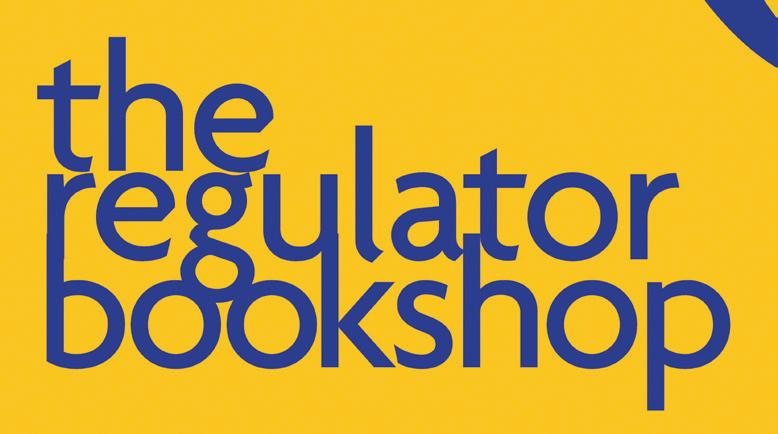
SU | DO | KU
Difficulty level: HARD

SERVICES

SU | DO | KU
There is really only one rule to Sudoku: Fill in the game board so that the numbers 1 through 9 occur exactly once in each row, column, and 3x3 box. The numbers can appear in any order and diagonals are not considered. Your initial game board will consist of several numbers that are already placed. Those numbers cannot be changed. Your goal is to fill in the empty squares following the simple rule above.
Difficulty level: HARD

EMPLOYMENT
Application Development Senior Managers
Application Development Senior Managers (Cigna-Evernorth Services Inc., Raleigh, NC) Provide tech’l leadership for ongoing initiatives w/in OIA to evolve AI, ML, IDP, Conversational AI, & Robotics capabilities. Partial virtual/work from home benefit. Reqs a Bach’s deg in Comp Sci, Electronics Engg, or a closely related field & 5 yrs of IT exp (or a Master’s deg in Comp Sci, Electronics Engg, or a closely related field & 3 yrs of IT exp). Send resumes to mukesh.pandey@evernorth.com
Field Service Technician
Field Service Technician (FST-DKM). Assembles mechanical components & sub-assemblies, accurately, safely, & efficiently, with proper hand & power tools in the proper sequence utilizing “best practice” methods. Travel required 75% to customer sites across the US & Canada. Reqs BS+1 yr rltd exp. Mail resumes to Syntegon Technology Services: HR Manager, 2440 Sumner Blvd., Raleigh, NC 27616. Must ref job title & code.
Full-time Membership Coordinator
There is really only one rule to Sudoku: Fill in the game board so that the numbers 1 through 9 occur exactly once in each row, column, and 3x3 box. The numbers can appear in any order and diagonals are not considered. Your initial game board will consist of several numbers that are already placed. Those numbers cannot be changed. Your goal is to fill in the empty squares following the simple rule above.

If you’re stumped, find the answer keys for these puzzles and archives of previous puzzles (and their solutions) at indyweek.com/puzzles-page or scan this QR code for a link. Best of luck, and have fun!

A small climate justice nonprofit in Durham is looking for a full-time membership coordinator to manage membership recruitment, volunteer engagement and fundraising activities and a full-time outreach coordinator to manage projectsand partner relationships in communities across NC. Pay commensurate with experience. Benefits include PTO, retirement, health insurance. Submit cover letter and resume to ncwarn@ncwarn.org by April 15.We encourage applicants from marginalized and underrepresented groups. Visit www.ncwarn.org for full job description.
Infrastructure Engineering Advisors
Infrastructure Engineering Advisors (CignaEvernorth Services, Raleigh, NC) - Build/maintain tools, solutions, microservices associated w/ deployment of operations platforms. P/T telecommuting. REQS: Bachelor's or for equiv deg +3 yrs exp. Send resume to: nic.bernard@evernorth.com, ref# 23414-0068.
Remote Administrative Representative
This remote administrative representative job will offer a fair salary and a requirement of 5 to 8 hours per week for data entry and reports. contact: tillerlux1016@gmail.com
Senior Automation Engineer
Laboratory Corporation of America Holdings in Durham, NC seeks a Senior Automation Engineer to lead team for design & development of test automation frameworks for UI, Restful & SOAP APIs. Reqs BS+5yrs exp.; To apply, send resume to: labcorphold@labcorp.com; Ref #240304.
26 April 3, 2024 INDYweek.com INDY CLASSIFIEDS classy@indyweek.com L A S S I F I E D S HEALTH & WELL BEING 919-416-0675 www.harmonygate.com
© Puzzles by Pappocom
© Puzzles by Pappocom
C L A S S I F I E D S
EMPLOYMENT
Senior QA Analyst/Software Engineer
Laboratory Corporation of America Holdings in Durham, NC seeks a Senior QA Analyst/Software Engineer (QA Test Automation Developer & Engineer) to develop fully automated testing harness for automation procedures. Reqs BS+5yrs exp.; To apply, submit resume to: labcorphold@labcorp.com . Ref: 20240216
Senior Information Technology Auditor
Senior Information Technology Auditor sought by Apex Tool Group, LLC for the Apex, NC location. Candidate must have a Bachelors or foreign equivalent degree (If no bachelors will accept one year of related experience for each year not completed toward a bachelors) AND three years of Risk and Control Matrix experience. Candidate must have CIA and CISA certification. Must have experience in: COSO and COBIT framework; Handling IT General Controls and liaising with external auditors; Design/redesign risk and control matrix (RCM) and executing in line with the audit scope; Conducting complex audit assignments utilizing SOX, SOC reporting analysis, and risk management protocols; Auditing ERP general and application controls across all business processes; ERP, ServiceNow, Workiva; and Accounting concepts and controls, project management controls, IT General controls, cybersecurity controls and SDLC frameworks. Submit proof of CIA and CISA certification. Please apply online: https://www.apextoolgroup.com/.
Software Engineering Advisors
Software Engineering Advisors - Cigna-Evernorth Services Inc. (Raleigh, NC): Design, develop & test scripts & SW for commercial & in-house enterprise IT platforms, incl Source Code Management, Code Quality, Testing & CI/CD. Partial WFH benefit available. Req: bachelors/foreign equiv in IT, Computers, Electronics & Comm Engg, Engg, or rel’d + 2 yrs exp in SW dev. Must have exp w/ Python, Shell Scripting, Node.js, JSON, Cucumber, Java, Zephyr, Selenium, Jenkins, Ansible, and Agile. Resumes to: rajat.makhecha@cigna.com
Software Engineering Director
Software Engineering Director, F/T at Truist (Raleigh, NC) Lead a team or teams responsible for technology solutions that meet business needs & satisfy risk & operational reqmts of the Tech organization. Identify & resolve complex tech’l, operational, risk mgmt, & organizational challenges for an LOB or several Sub LOBs. Must have Bach’s deg in Comp Sci, Comp Engg, or related tech’l field. Must have 8 yrs of progressive exp in s/ware engg or IT consulting positions performing the following: applying in-depth knowl in info systems & understanding of key business processes & competitive strategies related to the IT function to identify, apply, & implmt IT best practices; applying broad functional knowl in reqmt gathering, analysis, dsgn, dvlpmt, testing, implmtn, & deployment of applications; planning & managing projects & solving complex problems by applying best practice; providing direction & mentor less exp’d teammates; & utilizing exp w/: Rally, SOAP UI, AWS, Java, Spring, ISAM, Single Sign On, SAML, & Web Services. Position may be eligible to work remotely but is based out of & reports to Truist offices in Raleigh, NC. Must be available to travel to Raleigh, NC regularly for meetings & reviews w/ manager & project teams w/in 24-hrs’ notice. Apply online (https://careers. truist.com/) or email resume w/ cvr ltr to:
Paige Whitesell, Paige.Whitesell@Truist.com (Ref Job# R0085681)
EVENTS & ACTIVITIES
Jerry R. Wright Lecture
JungNC.org Jungian Psychoanalyst Jerry R. Wright lectures Friday 3/22/24 7:30pm
“PSYCHOLOGICAL MYSTICISM: Healing Religious and Political Tribaisim.” $10 Saturday workshop 10am-4pm, $60. Church of Reconciliation, Chapel Hill. www.JungNC.org Coming April 26/27, 2024 Michael Conforti on dreams.

INDYweek.com April 3, 2024 27 INDY CLASSIFIEDS classy@indyweek.com
3/20/24 CROSSWORD SOLUTION
































 Raleigh | Durham | Chapel Hill April 3, 2024
Raleigh | Durham | Chapel Hill April 3, 2024
















 BY GLENN MCDONALD arts@indyweek.com
BY GLENN MCDONALD arts@indyweek.com































































